(完整版)初中中考英语知识点考点总结(全)
- 格式:docx
- 大小:23.20 KB
- 文档页数:21
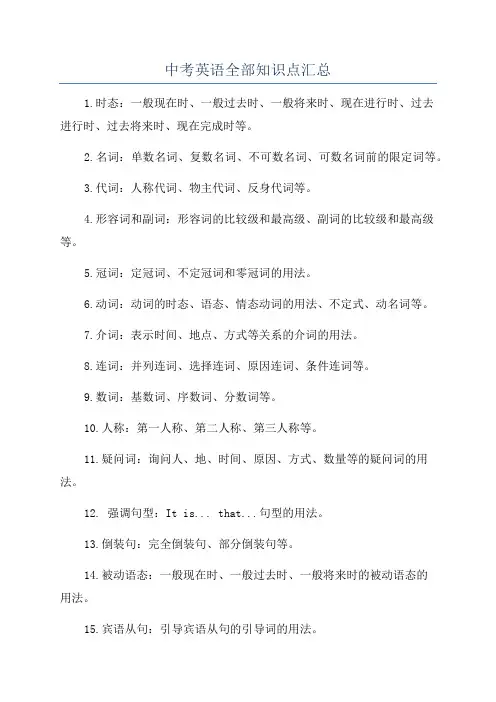
中考英语全部知识点汇总1.时态:一般现在时、一般过去时、一般将来时、现在进行时、过去进行时、过去将来时、现在完成时等。
2.名词:单数名词、复数名词、不可数名词、可数名词前的限定词等。
3.代词:人称代词、物主代词、反身代词等。
4.形容词和副词:形容词的比较级和最高级、副词的比较级和最高级等。
5.冠词:定冠词、不定冠词和零冠词的用法。
6.动词:动词的时态、语态、情态动词的用法、不定式、动名词等。
7.介词:表示时间、地点、方式等关系的介词的用法。
8.连词:并列连词、选择连词、原因连词、条件连词等。
9.数词:基数词、序数词、分数词等。
10.人称:第一人称、第二人称、第三人称等。
11.疑问词:询问人、地、时间、原因、方式、数量等的疑问词的用法。
12. 强调句型:It is... that...句型的用法。
13.倒装句:完全倒装句、部分倒装句等。
14.被动语态:一般现在时、一般过去时、一般将来时的被动语态的用法。
15.宾语从句:引导宾语从句的引导词的用法。
16.定语从句:引导定语从句的引导词的用法。
17.状语从句:时间状语从句、条件状语从句、方式状语从句、地点状语从句等。
18.名词性从句:主语从句、宾语从句、表语从句等。
19.并列句:连接并列句的连词的用法。
20.简单句:主谓结构、主谓宾结构、主谓表结构。
21.复合句:主从复合句、从属连词引导的句子。
22.比较级和最高级:形容词和副词的比较级和最高级形式的构成和用法。
23.句型转换:祈使句、感叹句、反义疑问句等句型的转换。
24.词汇:常用动词、形容词、副词、短语、习惯用语和常用短语等。
25.阅读理解:根据文章内容回答问题、根据文章理解并推断意义、根据文章选择正确答案、回答文章也提出的问题等。
26.完形填空:根据短文内容选择正确的词或词组填空。
27.书面表达:根据题目要求写一篇文章或对话。
以上为中考英语全部知识点的部分汇总。
希望对你的学习有所帮助。
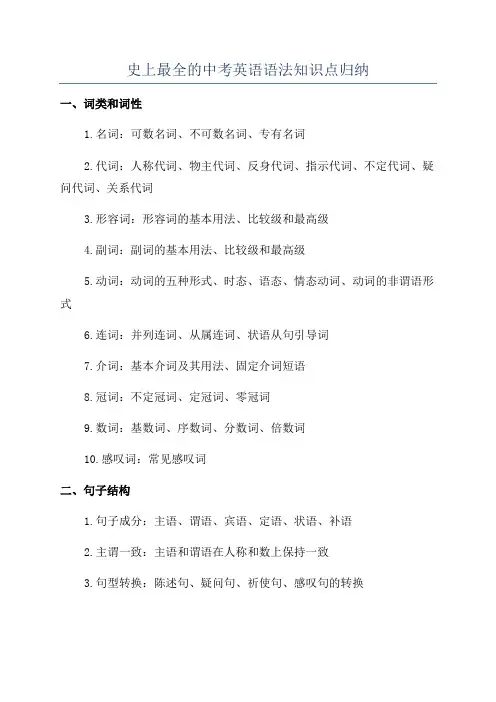
史上最全的中考英语语法知识点归纳一、词类和词性1.名词:可数名词、不可数名词、专有名词2.代词:人称代词、物主代词、反身代词、指示代词、不定代词、疑问代词、关系代词3.形容词:形容词的基本用法、比较级和最高级4.副词:副词的基本用法、比较级和最高级5.动词:动词的五种形式、时态、语态、情态动词、动词的非谓语形式6.连词:并列连词、从属连词、状语从句引导词7.介词:基本介词及其用法、固定介词短语8.冠词:不定冠词、定冠词、零冠词9.数词:基数词、序数词、分数词、倍数词10.感叹词:常见感叹词二、句子结构1.句子成分:主语、谓语、宾语、定语、状语、补语2.主谓一致:主语和谓语在人称和数上保持一致3.句型转换:陈述句、疑问句、祈使句、感叹句的转换4.句子的简单句、并列句、复合句、复合句类型(定语从句、状语从句、宾语从句)三、时态和语态1.一般现在时2.一般过去时3.现在进行时4.过去进行时5.一般将来时6.一般过去将来时7.现在完成时8.过去完成时9.现在完成进行时10.一般过去完成进行时11.被动语态四、非谓语动词1.不定式2.动名词3.动词-ing形式五、虚拟语气1.与事实相反的虚拟语气:与现在事实相反的虚拟语气、与过去事实相反的虚拟语气2.与将来事实相反的虚拟语气3.与现在条件相反的虚拟语气4.与过去条件相反的虚拟语气六、定语从句1.关系代词引导的定语从句2.关系副词引导的定语从句3.定语从句的嵌套七、状语从句1.时间状语从句2.地点状语从句3.方式状语从句4.原因状语从句5.条件状语从句6.比较状语从句7.目的状语从句8.结果状语从句八、宾语从句1.宾语从句的引导词2.宾语从句的位置九、名词性从句1.主语从句2.宾语从句3.表语从句十、情态动词1.can和could2.may和might3.will和would4.shall和should5.must和have to6.need和dare以上是中考英语语法知识点的简要归纳,更详细的内容需要根据课本和学习资料进行学习和理解。

史上最全的中考英语语法必考知识点大全
一、时态
1.一般现在时:叙述现在地基本情况及习惯性动作,主动形式表示现在状态或现在客观存在的事实。
2.一般过去时:表示过去其中一时间发生的动作和存在的状态。
3.现在完成时:表示从过去其中一时间开始,一直延续到现在的动作或状态。
4.现在进行时:表示此刻正在发生的动作或存在的状态。
5.一般将来时:表示将来其中一时刻或其中一段时间内发生的动作或存在的状态。
6.过去将来时:表示过去时预计或计划将来要发生的动作或存在的状态。
7.状语从句中的时态:
(1)主句是一般现在时,从句一般用一般现在时;
(2)主句是一般过去时,从句一般用一般过去时;
(3)主句是一般将来时,从句一般用一般将来时;
(4)主句是现在完成时,从句一般用过去将来时。
二、句法结构
1.主谓一致:谓语动词表达的动作所发生的时间和主语之间是一致的关系。
2.主语从句:即用疑问词引导的从句,其主语在句中充当整个句子或者句子成分的主语。
3.主谓宾:即主语、谓语动词和宾语三部分的句子结构。
4.定语从句:即用关联词引导的附加句,其作用是对主句中的一些名词或代词进行补充说明。
5.宾语从句:即用从属连词引导的从句,其作用是把从句的内容作为宾语放在动词后面。
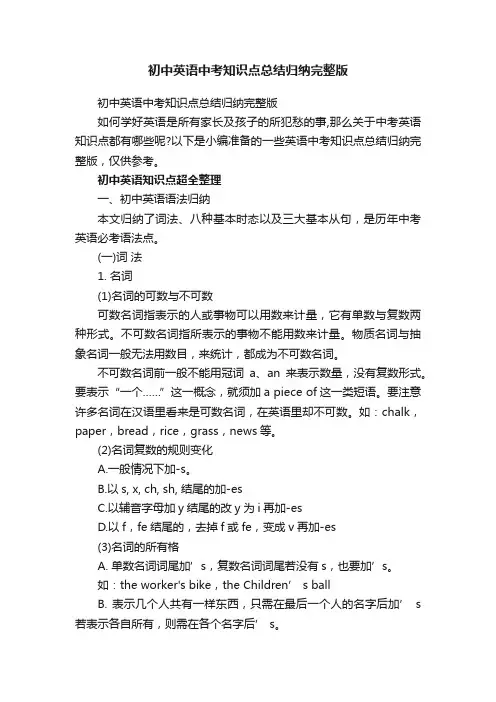
初中英语中考知识点总结归纳完整版初中英语中考知识点总结归纳完整版如何学好英语是所有家长及孩子的所犯愁的事,那么关于中考英语知识点都有哪些呢?以下是小编准备的一些英语中考知识点总结归纳完整版,仅供参考。
初中英语知识点超全整理一、初中英语语法归纳本文归纳了词法、八种基本时态以及三大基本从句,是历年中考英语必考语法点。
(一)词法1. 名词(1)名词的可数与不可数可数名词指表示的人或事物可以用数来计量,它有单数与复数两种形式。
不可数名词指所表示的事物不能用数来计量。
物质名词与抽象名词一般无法用数目,来统计,都成为不可数名词。
不可数名词前一般不能用冠词a、an来表示数量,没有复数形式。
要表示“一个……”这一概念,就须加a piece of这一类短语。
要注意许多名词在汉语里看来是可数名词,在英语里却不可数。
如:chalk,paper,bread,rice,grass,news等。
(2)名词复数的规则变化A.一般情况下加-s。
B.以s, x, ch, sh, 结尾的加-esC.以辅音字母加y结尾的改y为i再加-esD.以f,fe结尾的,去掉f或fe,变成v再加-es(3)名词的所有格A. 单数名词词尾加’s,复数名词词尾若没有s,也要加’s。
如:the worker's bike,the Children’ s ballB. 表示几个人共有一样东西,只需在最后一个人的名字后加’ s 若表示各自所有,则需在各个名字后’ s。
如:This is Lucy and Licy’ s room.These are Kate's and jack’ s rooms.C. 如果是通过在词尾加—s构成的复数形式的名词,只加’。
如:the students’ books,the girls’ blouses(另外:名词+of+名词名词是有生命的,我们就用’s结构来表示所有关系。
如果名词所表示的事物是无生命的,我们就要用名词+of+名词的结构来表示所有关系。
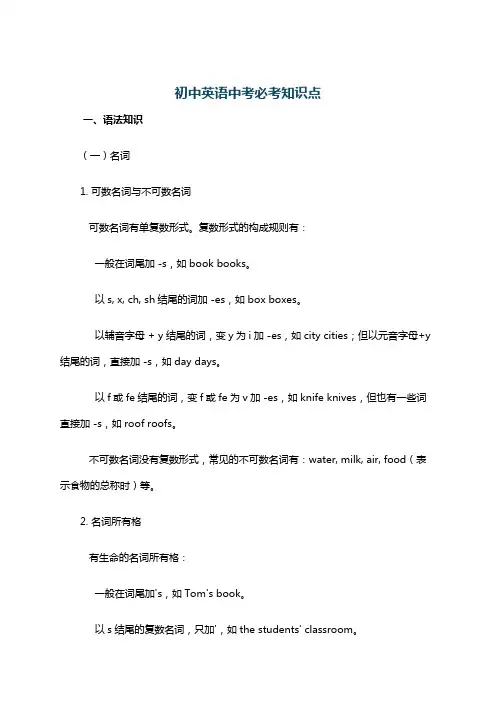
初中英语中考必考知识点一、语法知识(一)名词1. 可数名词与不可数名词可数名词有单复数形式。
复数形式的构成规则有:一般在词尾加 -s,如book books。
以s, x, ch, sh结尾的词加 -es,如box boxes。
以辅音字母 + y结尾的词,变y为i加 -es,如city cities;但以元音字母+y 结尾的词,直接加 -s,如day days。
以f或fe结尾的词,变f或fe为v加 -es,如knife knives,但也有一些词直接加 -s,如roof roofs。
不可数名词没有复数形式,常见的不可数名词有:water, milk, air, food(表示食物的总称时)等。
2. 名词所有格有生命的名词所有格:一般在词尾加's,如Tom's book。
以s结尾的复数名词,只加',如the students' classroom。
表示两者或两者以上共同拥有时,只在最后一个名词后加's;表示各自拥有时,每个名词后都加's。
例如:Lucy and Lily's mother(她们共同的妈妈);Lucy's and Lily's rooms(她们各自的房间)。
无生命的名词所有格常用“of + 名词”结构,如the window of the room。
(二)代词1. 人称代词主格:I, you, he, she, it, we, you, they,在句中作主语。
例如:I like English.宾格:me, you, him, her, it, us, you, them,在句中作宾语。
例如:He helps me.2. 物主代词形容词性物主代词:my, your, his, her, its, our, your, their,后面要接名词。
例如:This is my book.名词性物主代词:mine, yours, his, hers, its, ours, yours, theirs,相当于“形容词性物主代词+名词”。
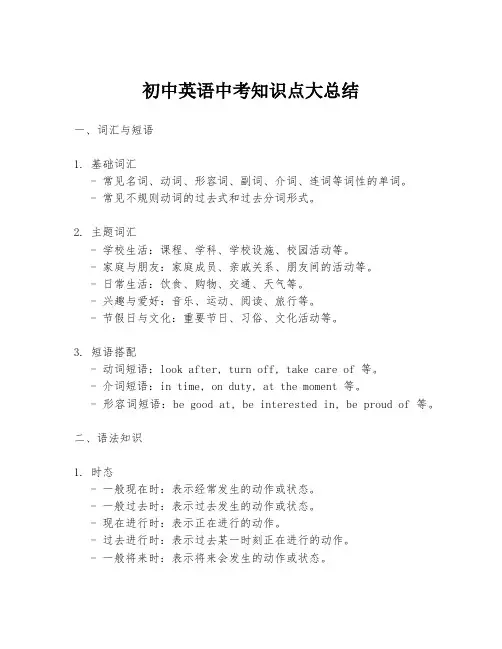
初中英语中考知识点大总结一、词汇与短语1. 基础词汇- 常见名词、动词、形容词、副词、介词、连词等词性的单词。
- 常见不规则动词的过去式和过去分词形式。
2. 主题词汇- 学校生活:课程、学科、学校设施、校园活动等。
- 家庭与朋友:家庭成员、亲戚关系、朋友间的活动等。
- 日常生活:饮食、购物、交通、天气等。
- 兴趣与爱好:音乐、运动、阅读、旅行等。
- 节假日与文化:重要节日、习俗、文化活动等。
3. 短语搭配- 动词短语:look after, turn off, take care of 等。
- 介词短语:in time, on duty, at the moment 等。
- 形容词短语:be good at, be interested in, be proud of 等。
二、语法知识1. 时态- 一般现在时:表示经常发生的动作或状态。
- 一般过去时:表示过去发生的动作或状态。
- 现在进行时:表示正在进行的动作。
- 过去进行时:表示过去某一时刻正在进行的动作。
- 一般将来时:表示将来会发生的动作或状态。
2. 语态- 被动语态:表示动作的承受者。
- 常见时态的被动语态形式。
3. 非谓语动词- 动名词:作为名词使用,表示动作。
- 分词:现在分词和过去分词,用作形容词或副词。
- 不定式:作为名词、形容词、副词等。
4. 情态动词- can/could, may/might, must, should/ought to 等。
- 表示可能性、建议、义务等。
5. 代词- 人称代词、物主代词、反身代词、指示代词、疑问代词等。
6. 连词- 并列连词:and, but, or, so 等。
- 从属连词:because, since, although, if, when 等。
7. 句子结构- 简单句、复合句、复杂句。
- 陈述句、疑问句、祈使句、感叹句。
8. 特殊句式- 倒装句:表示强调或条件。
- 省略句:在某些情况下可以省略句子的某些成分。
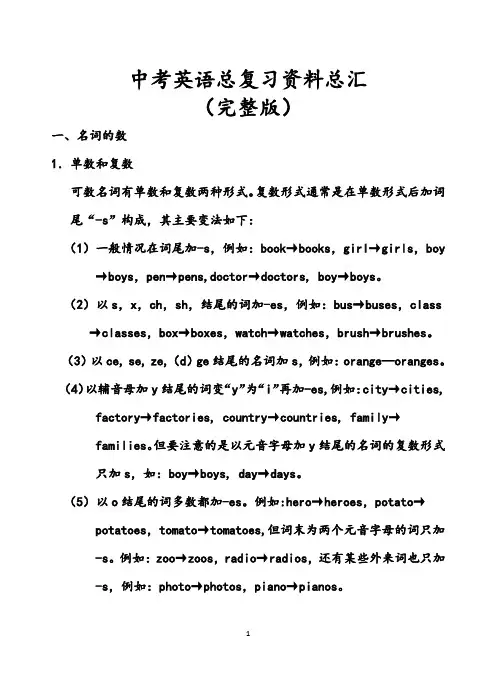
中考英语总复习资料总汇(完整版)一、名词的数1.单数和复数可数名词有单数和复数两种形式。
复数形式通常是在单数形式后加词尾“-s”构成,其主要变法如下:(1)一般情况在词尾加-s,例如:book→books,girl→girls,boy →boys,pen→pens,doctor→doctors, boy→boys。
(2)以s,x,ch,sh,结尾的词加-es,例如:bus→buses,class →classes,box→boxes,watch→watches,brush→brushes。
(3)以ce, se, ze,(d)ge结尾的名词加s,例如:orange—oranges。
(4)以辅音母加y结尾的词变“y”为“i”再加-es,例如:city→cities, factory→factories, country→countries, family→families。
但要注意的是以元音字母加y结尾的名词的复数形式只加s,如:boy→boys, day→days。
(5)以o结尾的词多数都加-es。
例如:hero→heroes,potato→potatoes,tomato→tomatoes,但词末为两个元音字母的词只加-s。
例如:zoo→zoos,radio→radios,还有某些外来词也只加-s,例如:photo→photos,piano→pianos。
(6)以f或fe结尾的词,多数变f为v再加-es,例如:knife→knives,leaf→leaves, half→halves。
复数词尾s(或es)的读音方法如下表所示。
复数词尾s(或es)的读音方法(7)少数名词有不规则的复数形式,例如:man→men,woman→women,tooth→teeth,foot→feet,child→children,mouse→mice。
【注意】与man和woman构成的合成词,其复数形式也是-men和-women。
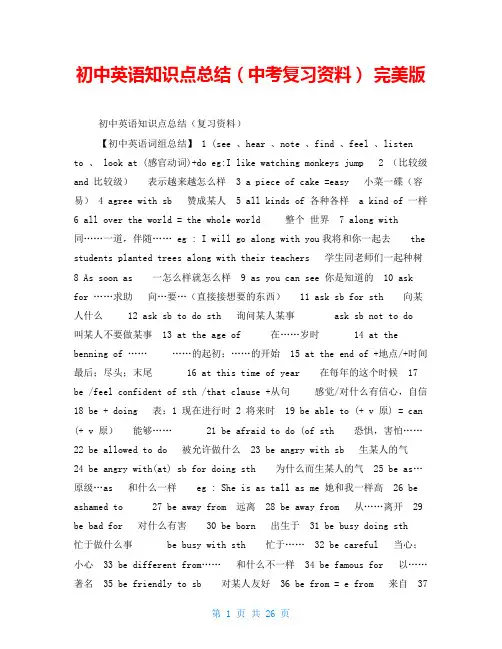
初中英语知识点总结(中考复习资料)完美版初中英语知识点总结(复习资料)【初中英语词组总结】 1 (see 、hear 、note 、find 、feel 、listento 、 look at (感官动词)+do eg:I like watching monkeys jump 2 (比较级and 比较级)表示越来越怎么样 3 a piece of cake =easy 小菜一碟(容易) 4 agree with sb 赞成某人 5 all kinds of 各种各样 a kind of 一样6 all over the world = the whole world 整个世界 7 along with 同……一道,伴随…… eg : I will go along with you我将和你一起去 the students planted trees along with their teachers 学生同老师们一起种树8 As soon as 一怎么样就怎么样 9 as you can see 你是知道的 10 askfor ……求助向…要…(直接接想要的东西) 11 ask sb for sth 向某人什么 12 ask sb to do sth 询问某人某事 ask sb not to do 叫某人不要做某事 13 at the age of 在……岁时 14 at the benning of …… ……的起初;……的开始 15 at the end of +地点/+时间最后;尽头;末尾 16 at this time of year 在每年的这个时候 17be /feel confident of sth /that clause +从句感觉/对什么有信心,自信18 be + doing 表:1 现在进行时 2 将来时 19 be able to (+ v 原) = can (+ v 原)能够…… 21 be afraid to do (of sth 恐惧,害怕……22 be allowed to do 被允许做什么 23 be angry with sb 生某人的气24 be angry with(at) sb for doing sth 为什么而生某人的气25 be as…原级…as 和什么一样 eg : She is as tall as me 她和我一样高 26 be ashamed to 27 be away from 远离 28 be away from 从……离开 29 be bad for 对什么有害 30 be born 出生于 31 be busy doing sth忙于做什么事 be busy with sth 忙于…… 32 be careful 当心;小心33 be different from…… 和什么不一样 34 be famous for 以……著名 35 be friendly to sb 对某人友好 36 be from = e from 来自 37be full of 装满……的 be filled with 充满 eg: the glass is full of water the glass is filled with water 38 be glad+to+do/从句 39be going to + v(原)将来时 40 be good at(+doing) = do well in 在某方面善长, 善于…… 41 be good for 对什么有好处 42 be hy todo 很高兴做某事 43 be helpful to sb 对某人有好处 44 be in good health 身体健康 45 be in trouble 处于困难中 46 be interested in 对某方面感兴趣 47 be late for = e late to 迟到 eg: Be late for class 上课迟到 48 be like 像…… eg : I#27;m like my mother 49 be mad at 生某人的气 50 be made from 由……制成(制成以后看不见原材料) 51 be made of 由……制成(制成以后还看得见原材料) 52 be not sure 表不确定 53 be on a visit to 参观 54 be popular with sb 受某人欢迎 55 be quiet 安静 56 be short for 表的缩写 eg: 陶 is short for 陶俊杰 57 be sk in bed 生病在床 58 be sorry to dosth be sorry for sb eg : I am sorry for you 59 be sorryto hear that 60 be sorry to trouble sb 61 be strt in doing sth 严于做某事 62 be strt with sb 对某人要求严格 63 be strt with sb in sth 某方面对某人严格 64 be supposed to do 被要求干什么 65 be sure 表确定 66 be sure of doing sth 对做某事有信心 67 be sure of sth 对做某事有信心 68 be sure that sth 对做某事有信心 69 be sure to do sth一定会做某事We are sure to learn English well 我们一定能学好英语 70 be terrified of + 名/动doing 害怕…… 71 beterrified to do sth 害怕做某事72 be the same as … 和什么一样 73 be used to doing sth 习惯做某事 My father is used to getting up early 我爸爸习惯早 74 be worth doing 值得做什么 75 be(feel) afraidto do sth 害怕做某事be afraid of sth 害怕某物 be afraid that 丛句76 because+句子 because of +短语 eg : He was late because he had a headache He was late because of his headache 77 ben to do = start to do 开始做某事start…with…=ben…with… 以什么开始什么 78between…and… 两者之间 79 borrow sth from sb 向……借…… lend sth to sb ( lend sb sth 借给……什么东西 80 both = the same(as) = not different(from) 表相同 81 bother 打扰 bother sb to do sth eg : I#27;m sorry to bother you ,but can you tell me to way to thestation 我十分道歉打扰你,但是你能告诉我怎么去车站 82 by the end of 到……为止 83 call sb sth eg : We call him old wang 85 catch up with sb 赶上某人 86 chat with sb 和某人闲谈 take sb to + 地点带某人去某地 87 e in 进 88 e over to 过来 89 e up with 提出 eg: Can you e up with a good idea 你能想出一个好办法吗? 90 munate withsb 和某人交流 91 consider + doing 考虑做什么 eg : Why not consider going to lu zhou 为什么不考虑去泸州? 92 dance to 随着……跳舞 93 decide to do sth 决定做某事 94 do a survey of 做某方面的调查 95 do better in 在……方面做得更好 96 do wrong 做错 97 Don#27;t forget to do sth 不要忘了做某事 98 Don#27;t mind +doing /从句 /名词不要介意…… 99 each +名(单)每一个…eg : Each student has many books 每一个学生都有一些书 100 end up +doing enjoy +doing喜欢 102 escape from 从……逃跑 103 epect to do sth 期待做某事 104 fall down 摔下来fall off 从哪摔下来 105 fall in love with sb /sth 爱上什么 106 far from 离某地远 107 find +it +adj +to do 发现做某事怎么样 108 findsb/sth +adj 发现什么怎么样 eg : I find the book interesting 109 finish 完成+doing(名词) 110 fit to sb = be fit for sb 适合某人 111 forget to do 没有做而忘了 forget doing 做了而又忘了112 from…to… 从某某到某某 eg: From me for her 113 get /have sth down 做完,被(别人)做…eg: I have my hair cut 我理了发(头发被剪了) Tom got his bad tooth pulled out 汤母把他的坏牙拔掉了(被牙医拔掉了) 114 get a part-time job= find a part-time job 115 get along well with sb = geton well with sb 与某人相处得好 116 get along with sb = get on withsb 与某人相处 117 get ready for = be ready for为什么而准备 118 get sbin to trouble 给某人带来麻烦120 get…from… 从某处得到某物 121 ve a talk 做报告 122 ve sth to sb ve sb sth 给某人某物 123 go fish 钓鱼 go swimming 游泳 124 go on to do 去做下一件事 go on doing 继续做这件事 125 go out away from远离 go out of 从….离开 126 go to school 上学(用于专业的)go to the school 去学校(不一定是上学)127 good way to 好方法 128 hate to do 讨厌没做过的事 hate doing 讨厌做过的事 129 have a party for sb 举办谁的晚会 130 have a talk 听报告谈一谈 131 have been doing 现在完成进行时132 have been to …( 地方)……去过某过地方have gone to …(地方)去了某地还没回来 133 have fun +doing 玩得高兴 134 have sth to do 有什么事要做 135 have to do sth 必须做某事 136 have trouble (problem) (in) doing sth 做什么事情有麻烦137 have…time +doing 138 hav e…(时间)…off 放……假 139 hear sb +do/doing 听见某人做某事/正在做某事 140 help a lot 很大用处 141 help sb with sth\one#27;s sth 帮助某人某事(某方面) help sb (to) do sth 帮助某人做某事 142 hope to do sth 希望做某事 143 How about(+doing) = What about(+doing) 144 how do you like = what do you think of 你对什么的看法 145 if : 是否=wether eg: I don#27;t know if (wether) I should go to the party 我不知道我是否应该去参加晚会 He don#27;t know if (wether) we will arrive on time tomorrow morning 他不知道我们明天早上是否能准时到达 146 if :如果,假如(全部接一般时态)+条件语态从句 eg: I#27;ll go to LuZhou if it does#27;t rain 假如明天不下雨,我就去泸州 If they change the plan they will let me know 假如他们要改变计划,他们会让我知道的 I#27;ll go to England ,if I have enough money year 如果我明年由足够的钱,我就要去英国 147 in one#27;s opinion = sb think 某人认为 148 in some ways 在某些方面 149 in the end = finally(adv) 最后150 in the north of… 什么在什么的北方(north 北 sowth 南 west 西 east 东) 151 in the sun 在太阳下 152 increase 增加 eg : They#27;ve increased the prece of petrol by 3 他们把石油价增加了3 153 instead of +(名)代替 eg: I#27;d like an le instead of a pear 我想要苹果,而不要梨子 154 introduce sb to sb 介绍某人给某人 introduce oneself 自我介绍 155 invite sb to do sth 邀请某人做某事 156 It takes sb sometime to do sth 做某人花掉某人多少时间 eg : It took me 5 minutes to do my homework It takes me half an hour to cook 157It#27;s +adj +for sb to do sth 对某人来说做某事怎么样 158 It#27;s +adj +to do 做某事怎么样 159 It#27;s +adj for sb 对于某人来说怎么样It#27;s +adj of sb 对某人来说太怎么样 160 It#27;s +adj(for sb) to do(对某人来说)做某事怎么样 It#27;s +adj of sb to do sth 对某人来说做某事太怎么样 eg : It#27;s ne of you to help me with my English 161 It#27;s a good idea for sb to do sth 对…… 来说是个好主意 162 It#27;s important to sb 对某人来说很重要 eg: It#27;s important to me 163 It#27;s time to do sth It#27;s time for sth 到了该去做某事的时间 eg : It#27;s time to have class It#27;s time for class 该去上课了 164 join = take part in 参加 165 just now 刚才 166 keep +sb /sth +adj /介词短语让什么保持什么样?167 keep out 不让…… 进入 168 keep sb adj 让……保持…… keep healthy 保持健康 169 key to +名词表示:某物的钥匙或某题的答案170 key to… anser to … key 可以是答题或钥匙 171 laugh at… 取笑…… 172 learn by oneslfe 自学 173 learn from sb 向某人学习 174 learn to do sth 学做某事 175 let sb do sth 让某人做某事 176 Let sb down 让某人失望 eg :We shouldn#27;t let our farents down 我们不应该让我们的父母失望177 live from :离某地远 178 live in +大地方 /at +小地方居住在某地179 look after = take care of 照顾照看 180 lose one#27;s way 谁迷路 181 make a decision to do sth 决定做某事 182 makefriends with sb 和谁成为朋友 eg : I want to make friends withyou make it early 把时间定的早一点 184 make on ehibition ofoneself 让某人出洋相 185 make sb /n +n 使什么成为什么 eg : I made her my step moller I made you my wife 186 make sb /sth+adj 使某人(某物)怎么样 eg : You must made your bed clean187 make sb /sth adj 使某人/某物怎么样 188 make sb do sth 让某人做某事 189 make up be made up of (被动语态)由……组成 190 make…difference to… 191 mind sb to do mind one#27;s doing 介意……做什么 192 most +名 most of +代 193 much too +形容词194 must be 一定 195 need +名词 196 need sb do sth 需要某人做某事 197 need to do (实义动词) need do (情态动词) 198 no /neithrof hate to do no /neithr of hate doing 199 no +名词 20 not anymore = no more 再也不…… eg: He didn#27;t cry anymore 201 not… (形、副)at all eg: He#27;s not tall at all she doesn#27;t junp far at all 202 not…at all 一点都不 203not…either表否定,也不 eg : I don#27;t japanse either Idon#27;t have sister, either 我也没有姐姐204 not…until 直到……才…… 205 offer / provide sb with sth 给某人提供 206 offersb sth ( offer sth to sb 提供什么东西给某人 eg : I offer you water(I offer water to you 我给你提供水207 on one#27;s way to… 在谁去那的路上 208 on the one hand 一方面 on the other hand 另一方面 209 on the phone = over the phone 用电话交谈 210 on time 准时in time 及时 211 one day =some day =someday 一天,有一天 212one of +可数名词的复数形式 213 one to another 一个到另一个 214over and over an 一遍又一遍的 eg : He cleaned the floor over and over an 215 part-time job 兼职工作 fall-time job 全职工作216 pay for… 付……钱 pay the bill 开钱,付钱 217 please +do 218 please help yourself 219 pleased with sb 220 pool into = poreinto 221 practe +doing 练习做某事 222 prefer sth to sth 相对……更喜欢…… eg : I prefer physs to chemisty 在物理和化学中,我更喜欢物理 prefer sb not to do sth 更愿意… eg: I prefer her not to e 我不喜欢她不来 223 pretend to do sth 装着去做什么pretend that 从句 eg : The two cheats pretended to be working very hard 这两个骗子装着努力工作224 rather…than 宁可……也不…… eg : I would rather be a doctor than a teacher 我愿肯当医生,也不当老师225 regard…as 把……当作…… I regard you as my friend 我把你当作我的朋友 226 remid sb about sth 提醒某人什么事 remid sbto do sth 提醒某人做某事 eg : he remids me about cooking (heremids me to cook 他提醒我做饭 227 remid sb of sth 使某人想起什么the words that (whh) the teacher talke to remind me of my mother 228 return sth to sb 还什么东西给某人 229 say to oneself 对自己说 230 say to sb 对某人说 231 sb spend somemoney on sth 花了多少钱在某事上232 sb spend sometime with sb 花了多少时间陪谁 233 sb spendsometime(in) doing sth 花了多少时间做某事 234 sb with sb +is sb and sb +are 235 see sb do 看见某人做过某事 see sb doing 看见某人正在做某事 236 seem to do/be +adj 显得怎么样 eg : You seem to be tired You seem to be hy 237 send +sb sth 送给某人某物238 send…to…把什么寄到哪里去? 239 shock 使……震惊 eg : Oh ,It#27;s only you ! You ve me a shock 啊,是你呀!吓我一跳 240 show sb sth 向某人展示某物 241 show sb sth = show sth to sb 拿什么东西给某人看 242 show sth to sb 向某人展示某物243 some…others… 一些……另一些…… 244 start…with… 从……开始ben…with… 从……开始 245 stay away from 远离…… eg : We#27;re told to stay away from the animals whe visiting the zoo 当我们参观zoo 时,我们要远离动物 246 s doing 停下正在做的事 247 s sb from doing sth 阻止某人做某事 248 s sb(from) doing 阻止某人做某事 249 s to do 停下正在做的事去做下一件事 250 such +名这样,这种 251 suit sb 适合某人252 surprise sb 使某人惊奇 to one#27;s surprise 令某人惊奇253 take classes 上课 254 take sb to 把某人带去 eg : I take you to the hospital 255 take walks = take a walk = go for a walk 散步 256①talk to 对谁说② talk with 和谁说③ talk of 谈到④ talk about 谈论关于…… 257 talk with sb 和某人说话 258 teach sb sth 教某人做某事 259 tell sb do sth 告诉某人做某事 261tell sb sth 告诉某人某事 tell sb that 丛句 tell sb not to do sth 262 tell sb 〔not〕 to do sth 告诉某人做什么263 tell…from…区别 264 thank you for +doing 265 the same +名词(doing)+as…… 266 the same…(名)…as as…(adj adv)…as 相同 267 the way to do sth =the way of doing st做某方面的方法 the way to +地方去哪的路 eg :Do you know the way to learn English Do you know the way oflearning English 268 the way to…(地点)到哪的 270transalte ……into…… 把什么翻译成什么 eg : Trasalte English into chinese 271 travel with sb和某人去旅游 272 try one#27;s best to dosth尽某人最大的努力去做某事eg: I will try my best to learn English well 273 try to do sth 想干什么,但没成功 try doing sth 想干什么,已经做过了274 try…试衣服 have a try 试一下 275 turn down 开小←→ turn up 开大 276 turn off 关上←→ turn on 打开 open 拆开 277 upside down 倒着278 visit to… 参观某个地方 279 wait for sb 等某人【比较since和for 】 Since 用来说明动作起始时间,for用来说明动作延续时间长度。

中考英语语法必考知识点大全
一、名词
1.名词的定义和分类
2.可数名词和不可数名词
3.数词和运用
4.名词所有格的表达
二、代词
1.人称代词的主格和宾格
2.物主代词的形式及其用法
3.反身代词的形式及其用法
4.不定代词的形式及其用法
三、形容词和副词
1.形容词的用法和比较等级
2.形容词性物主代词和名词性物主代词的区别
3.副词的分类和用法
4.副词的比较级和最高级
四、动词
1.动词的分类
2.动词的时态和语态
3.动词的不定式和动名词
4.动词的时态一致性和被动语态的转换
五、介词和介词短语
1.常见介词的用法
2.介词短语的位置及其修饰词的位置
六、连词和从句
1.并列连词和转折连词的用法
2.陈述句、祈使句和疑问句
3.陈述句的宾语从句和主语从句
4.特殊疑问句和宾补从句
七、时态和语态
1.一般现在时、一般过去时、一般将来时的构成和用法
2.现在进行时、过去进行时、将来进行时的构成和用法
3.现在完成时、过去完成时、将来完成时的构成和用法
4.一般现在时、一般过去时和一般将来时的被动语态的转换和用法
八、情态动词
1. can, could, may, might的用法
2. must, have to, need to的用法
3. should, ought to, shall的用法
4.情态动词在疑问句和否定句中的用法
九、固定搭配
1.动词与介词的固定搭配
2.形容词与副词的固定搭配
3.名词与介词的固定搭配
4.动词短语的固定搭配。
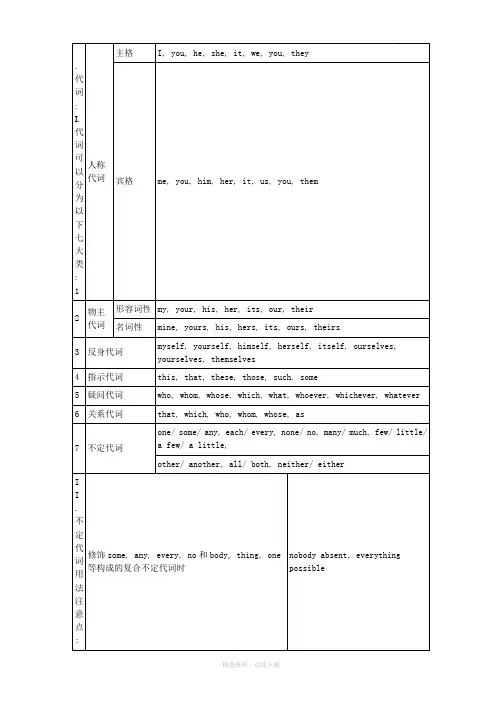
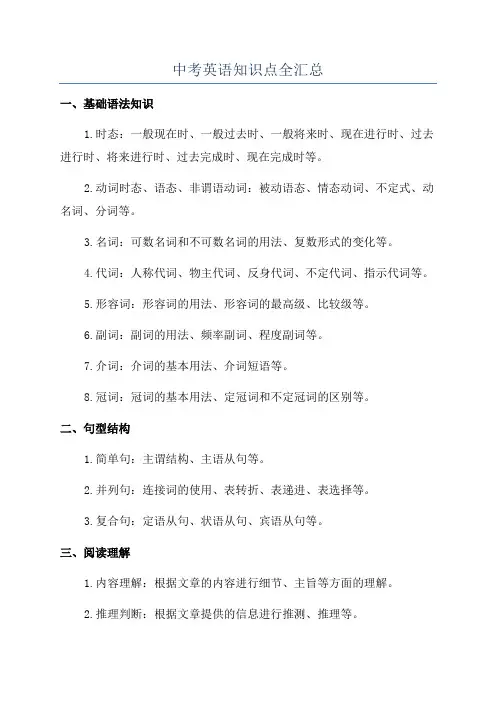
中考英语知识点全汇总一、基础语法知识1.时态:一般现在时、一般过去时、一般将来时、现在进行时、过去进行时、将来进行时、过去完成时、现在完成时等。
2.动词时态、语态、非谓语动词:被动语态、情态动词、不定式、动名词、分词等。
3.名词:可数名词和不可数名词的用法、复数形式的变化等。
4.代词:人称代词、物主代词、反身代词、不定代词、指示代词等。
5.形容词:形容词的用法、形容词的最高级、比较级等。
6.副词:副词的用法、频率副词、程度副词等。
7.介词:介词的基本用法、介词短语等。
8.冠词:冠词的基本用法、定冠词和不定冠词的区别等。
二、句型结构1.简单句:主谓结构、主语从句等。
2.并列句:连接词的使用、表转折、表递进、表选择等。
3.复合句:定语从句、状语从句、宾语从句等。
三、阅读理解1.内容理解:根据文章的内容进行细节、主旨等方面的理解。
2.推理判断:根据文章提供的信息进行推测、推理等。
3.表达能力:根据文章的要求进行写作、归纳总结等。
四、口语表达1.询问:询问信息、询问意见等。
2.辩论:陈述自己的观点、提出理由等。
3.请求:请求帮助、请求许可等。
4.提醒:提醒他人注意事项、提醒日程安排等。
5.道歉:道歉表达、解释原因等。
五、写作技巧1.写作表达:书信写作、日记写作、演讲稿写作等。
2.句子表达:句子的连贯性、句子的多样性等。
3.表达方式:使用形容词、副词、比喻、排比等方式进行表达。
4.逻辑结构:文章段落的开头、结尾、过渡等。
六、听力技巧1.理解题目:理解题干的意思、答题要求等。
2.抓关键词:抓住关键词帮助理解听力材料。
3.预测猜测:根据题干的提示预测可能听到的内容。
4.注意视听:注意听力材料中的重要信息、时间、地点等。
七、词语运用1.同义词、反义词的辨析。
2.词组的搭配。
3.词义的辨析。
八、语篇搭配1.对话:问答形式、交际用语等。
初中英语总复习知识点归纳第一部分:语法基础一、名词1. 可数名词和不可数名词的区分2. 名词的复数形式3. 名词所有格的用法二、代词1. 人称代词的主格和宾格2. 物主代词的形容词性和名词性3. 反身代词的用法4. 指示代词和疑问代词的用法三、形容词和副词1. 形容词和副词的词形变化2. 形容词和副词的用法3. 形容词和副词的比较级和最高级四、动词1. 动词的基本形式2. 动词的时态(一般现在时、一般过去时、一般将来时、现在进行时、过去进行时、现在完成时、过去完成时)3. 动词的语态(主动语态和被动语态)4. 系动词和助动词的用法五、冠词1. 不定冠词a和an的用法2. 定冠词the的用法3. 不使用冠词的情况六、连词1. 并列连词的用法2. 从属连词的用法七、介词1. 常用介词的用法2. 介词短语的结构和用法八、数词1. 基数词和序数词的用法2. 分数、小数和百分数的表达九、感叹词1. 感叹词的用法十、疑问词1. 疑问词的用法十一、句型结构1. 简单句的五种基本句型2. 并列句和复合句的结构和用法十二、主谓一致1. 主谓一致的原则2. 主谓一致的特殊情况十三、倒装句1. 完全倒装和部分倒装的区别2. 常见的倒装句型十四、省略句1. 省略句的结构和用法十五、强调句1. 强调句的结构和用法十六、虚拟语气1. 虚拟语气的用法十七、情态动词1. 情态动词的用法十八、非谓语动词1. 非谓语动词的分类和用法十九、固定搭配1. 常见的固定搭配二十、习惯用语和俚语1. 常见的习惯用语和俚语第二部分:词汇与短语一、词汇记忆方法1. 词根词缀记忆法2. 同义词和反义词记忆法3. 分类记忆法4. 联想记忆法二、常见词汇和短语1. 常用动词短语2. 常用形容词短语3. 常用介词短语4. 常用连词短语5. 常用固定搭配三、词汇辨析1. 形近词辨析2. 意思相近的词辨析3. 语境辨析四、词汇应用1. 词汇在句子中的应用2. 词汇在段落中的应用3. 词汇在文章中的应用五、词汇扩展1. 通过阅读扩展词汇2. 通过听力扩展词汇3. 通过口语和写作扩展词汇六、词汇复习策略1. 制定词汇复习计划2. 定期进行词汇测试3. 反复记忆和复习第三部分:阅读理解一、阅读技巧1. 快速阅读2. 精读3. 猜词技巧4. 理解文章主旨和大意5. 找出文章中的细节信息二、阅读题型1. 主旨大意题2. 细节理解题3. 推理判断题4. 词义猜测题5. 观点态度题三、阅读材料1. 故事类文章2. 议论文3. 说明文4. 应用文5. 新闻报道四、阅读理解策略1. 预览文章和首段2. 扫读文章找出关键词3. 仔细阅读理解文章内容4. 回答问题时注意关键词和语境5. 验证答案是否符合文章内容第四部分:写作技能一、写作技巧1. 确定写作目的和主题2. 拟定写作提纲3. 运用适当的句型和词汇4. 保持文章逻辑清晰5. 注意文章格式和标点符号二、写作题型1. 记叙文2. 议论文3. 说明文4. 应用文5. 日记和书信三、写作素材1. 人物描写2. 地点描写3. 事件描写4. 情感表达5. 观点陈述四、写作策略1. 多读优秀范文2. 多练习写作3. 请教老师和同学4. 反复修改和润色5. 保持写作兴趣和热情第五部分:听力理解一、听力技巧1. 预测听力内容2. 抓住关键词和关键信息4. 边听边记笔记5. 理解对话和独白的逻辑关系二、听力题型1. 简单听力理解题2. 听力细节理解题3. 听力推理判断题4. 听力主旨大意题5. 听力词义猜测题三、听力材料1. 对话2. 独白3. 新闻报道4. 广播节目5. 电影和电视剧片段四、听力理解策略1. 预览问题和选项2. 仔细听录音,注意关键词3. 根据听力内容进行推理和判断4. 选择最符合听力内容的答案5. 检查答案是否符合题意第六部分:口语表达一、口语技巧1. 准备话题和内容3. 保持语速适中4. 注意语法和词汇的准确性5. 保持自信和流畅二、口语题型1. 自我介绍2. 话题讨论3. 角色扮演4. 观点陈述5. 回答问题三、口语素材1. 日常生活话题2. 学校生活话题3. 社会热点话题4. 个人兴趣爱好话题5. 旅游和文化话题四、口语表达策略1. 多听多说,提高口语能力2. 模仿优秀的口语表达3. 与老师和同学进行口语练习4. 参加英语角和口语比赛5. 记录自己的口语表达,进行反思和改进第七部分:综合技能一、综合技巧1. 综合运用语法、词汇、阅读、写作、听力和口语等技能2. 注重语言的实际运用能力3. 提高语言的综合运用水平4. 培养跨文化交际能力5. 保持学习英语的兴趣和动力二、综合题型1. 完形填空2. 阅读理解3. 写作4. 听力理解5. 口语表达三、综合复习策略1. 制定综合复习计划2. 定期进行综合测试3. 反复练习和复习4. 请教老师和同学5. 保持学习英语的兴趣和热情。
中考英语知识点归纳2024一、词汇。
1. 重点单词。
- 动词。
- be动词(am/is/are/was/were)- 用法:用于表示人或事物的状态、性质等。
例如:I am a student.(一般现在时)He was at home yesterday.(一般过去时)- 实义动词。
- 及物动词(vt.):如like,后面直接跟宾语。
I like English.- 不及物动词(vi.):如run,不能直接跟宾语。
He runs fast.- 名词。
- 可数名词:有单复数形式。
如book - books,规则变化包括加 - s (books)、加 - es(boxes)等,还有不规则变化,如man - men,child - children等。
- 不可数名词:如water,milk等,没有复数形式,作主语时谓语动词用单数形式。
- 形容词和副词。
- 形容词:用于修饰名词,说明事物的特征。
例如:a beautiful flower。
形容词有原级、比较级(一般加 - er或more + 形容词原级,如taller,more beautiful)和最高级(加 - est或most+形容词原级,如tallest,most beautiful)的变化。
- 副词:用于修饰动词、形容词或其他副词。
例如:He runs quickly. 副词的比较级和最高级变化规则与形容词相似。
2. 词汇拓展。
- 前缀:如un -(unhappy,unlucky)表示否定;re -(reuse,rewrite)表示“再,重新”。
- 后缀:- er(worker,teacher)表示人;- ful(careful,helpful)表示“充满……的”。
3. 固定搭配。
- 动词短语。
- look forward to(期待),后面接名词或动名词。
I'm looking forward to your reply.- pay attention to(注意),同样接名词或动名词。
中考所有英语知识点归纳一、单词拼写1. 名词复数形式的构成规则,如box—boxes2. 形容词比较级与最高级的构成规则,如big—bigger—biggest3. 动词的过去式与过去分词的构成规则,如go—went—gone4. 动词第三人称单数形式的构成规则,如watch—watches5. 动词-ing形式的构成规则,如swim—swimming6. 词根词缀法拼写单词,如telephone, impossible二、时态1. 一般现在时、现在进行时、一般过去时、过去进行时、一般将来时、现在完成时的构成和用法2. 过去将来时、过去完成时的用法三、名词1. 可数与不可数名词2. 计量名词的用法3. 名词所有格的构成规则,如Tom的书4. 名词的单复数变化规则四、代词1. 人称代词的主格和宾格形式2. 物主代词的形式和用法,如mine, yours3. 反身代词的形式和用法,如myself, yourself4. 不定代词的形式和用法,如some, any, every, each, both, either, neither五、形容词和副词1. 形容词的位置和用法,如a big house, a nice girl2. 比较级和最高级的构成和用法,如taller, the tallest3. 副词的用法,如slowly, fast六、动词1. 不规则动词的变化规则,如go—went—gone2. 动词的短语形式,如look after, take off3. 动词不定式的形式和用法,如to go, go shopping4. 动词的时态和语态变化,如is going to do, was done5. 动名词的构成和用法,如swimming, enjoy swimming七、时态和语态1. 一般现在时、一般过去时、一般将来时、现在进行时、过去进行时、过去将来时、现在完成时、过去完成时的构成和用法2. 被动语态的构成和用法,如The book is written by Tom.3. 完成时态与被动语态的综合运用八、介词1. 常用介词的用法,如in, on, at2. 特殊介词的用法,如into, through, between九、连词1. 并列连词的用法,如and, but, or2. 引导从句的连词,如when, if, because十、冠词1. 定冠词和不定冠词的用法,如a book, an apple, the sun2. 特指某人某物的用法,如the girl, the car3. 不用冠词的情况,如go to school, at home十一、句式1. 肯定句、否定句、一般疑问句、特殊疑问句的基本结构和用法2. 直接引语和间接引语的转换,如He said, "I am happy." → He said that he was happy.3. 各种句式在实际交际中的综合运用以上是中考英语知识点的一个大致归纳,希望对你有所帮助。
中考英语考点归纳(全)[短语、词组归纳]由动词开头构成的短语、词组很多。
复习时应分类处理:一、动词+介词1.look at…看…,look like … 看上去像……,look after …照料…2.listen to…听……3.welcome to…欢迎到……4.say hello to …向……问好5.speak to…对……说话此类短语相当于及物动词,其后必须带宾语,但宾语无论是名词还是代词,都要放在介词之后。
二、动词+副词“动词+副词”所构成的短语义分为两类:A.动词(vt.)+副词1.put on 穿上2.take off脱下3.write down记下此类短语可以带宾语,宾语若是名词,放在副词前后皆可;宾语若是人称代词,只能放在副词的前面。
B.动词(vi)+副词。
1.come on赶快2.get up起床3.go home回家4.come in进来5.sit down坐下6.stand up起立此类短语属于不及物动词,不可以带宾语。
三、其它类动词词组1.close the door2.1ook the same3.go to work/class4.be ill5.have a look/seat6.have supper7.1ook young 8.go shopping 9.watch TV/games10. play games[介词短语聚焦]“介词+名词/代词”所构成的短语称为介词短语。
现将初中常用的介词短语按用法进行归类。
1.in+语言/颜色/衣帽等,表示使用某种语言或穿着……。
2.in + Row/ Team/ Class/ Grade等,表示“在……排/队/班级/年级”等。
3.in the morning/ afternoon/ evening/ 表示“在上午/下午/傍晚”等一段时间。
4.in the desk/ pencil-box/bedroom 等表示“在书桌/铅笔盒/卧室里”。
中考英语重点知识总结中考英语重点知识总结一、语法知识1. 时态:包括一般现在时、一般过去时、一般将来时、现在进行时等2. 语态:包括被动语态和主动语态3. 名词:可数名词和不可数名词的用法,名词所有格的表示方式等4. 代词:人称代词、指示代词、不定代词等的用法5. 形容词和副词:形容词和副词的原级、比较级和最高级的变化规则,修饰形容词和副词的方式等6. 数词:基数词和序数词的用法,用法的变化等7. 介词:介词的基本意义、用法和搭配等8. 连词:并列连词、从属连词和关联连词的用法等9. 定语从句和状语从句的用法等二、词汇知识1. 词义辨析:常见的近义词、反义词的区别和用法2. 同义词和反义词:词义相近或相反的词的辨析和用法3. 词组和固定搭配:常见的固定搭配和短语的用法4. 词形转换:词性转换、词语派生等5. 熟词僻义:常见词汇的熟词僻义的辨析三、拼写与标点符号1. 单词拼写:常见单词的正确拼写2. 时态和语态的标识:动词时态和语态的正确标识3. 代词和主谓一致:代词和其指代的名词在人称、数、性方面的一致4. 音标符号:英语中常见的音标和其发音规则5. 标点符号:英语中常用的标点符号和其正确用法四、阅读理解1. 主旨大意:从文章的标题、首句、尾句等来确定文章的主旨大意2. 细节理解:根据文章中的具体信息来回答问题3. 推理判断:根据文章中的暗示信息进行推理判断4. 看图作文:根据图片内容及相关提示,写一篇短文五、写作素材1. 日常生活:描述家庭、学校、饮食、运动、购物等方面的日常生活2. 人物描写:描述人物的外貌、性格、爱好等特点3. 环境描写:描写城市、乡村、风景名胜等环境的特点和感受4. 喜好与习惯:描述自己和他人的喜好、习惯和爱好等5. 事件经历:描述过去发生的一件事情或个人经历6. 情感表达:描述自己的感受、意见、建议等以上是中考英语的重点知识总结,涵盖了语法、词汇、拼写与标点符号、阅读理解以及写作素材等方面。
中考英语知识点归纳汇总-详细第一课时名词一、概述1、名词的属性:表示人或事物的名称抽象概念的词叫名词。
2、名词分普通名词和专有名词。
普通名词是表示某一类人或事物,或某种物体或抽象概念的名称。
如:teacher, desks, plates, milk, box等,专有名词表示某一特定的人、事物、地方团体、党派、国家机关、语言、节日等专用的名称。
(运用)如:China, Chinese, Saturday, June, Green, Beijing, Olympic等。
(专有名词的第一个字母要大写)二、可数名词与不可数名词1、可数名词是指表示人或事物,可以用数来计量的名词,有单复数之分。
如:glass-----glasses; book---- books2、不可数名词是指所表示的事物不能用数来计量。
如:paper, rice, water , milk, tea等。
3、有些名词在特定情况下由不可数变为可数名词。
Light travels faster than sound; (light:光线,不可数)The lights are on. (light:灯,可数)4、不可数名词的量的表示不可数名词一般无法用数来计算,前面不能用a或an或数词来表示数量,它的量往往借助于容器来表示。
如:a glass of milk ------ four glasses of milka piece of paper------two pieces of papera bag of rice------three bags of rice三、可数名词的复数形式(识记、运用)1、可数名词在应用时有单复数之分,单数变复数有规则变化和不规则变化两种。
规则变化情况变化形式例词一般情况加-sgirls; books;以s,x,ch,sh结尾的名词加-esclasses; boxes; watches;brushes以辅音字母加y结尾的名词变y为i, 加escity---cities; baby---babies以f或fe结尾的名词变f,fe为v, 加esknife---knives; leaf---leaves以O结尾的名词potatoes; tomatoes;photos; kilos; bamboos; radios 2、少数名词有不规则的变化形式policeman---policemen; man---men; woman---women; tooth---teeth; foot---feet; sheep---sheep; deer---deer; Japanese--- Japanese; Chinese --- Chinese; fish --- fish 四、名词所有格(运用)名词的所有格是表示所有关系的形式,它也有构成上的变化。
初中中考英语知识点考点总结一. 修饰比较级时常见的错误1. more不可修饰比较级,但much可以用来加强比较级,意为" ....... 的多,更 ... " He looks more younger than I. ( ) xHe looks much younger than I. (V)2. 比较的对象或范围出现错误。
1) The weather of Beijing is colder than Shanghai. ( ) x(比较的对象应该是上海的天气,而不是上海)The weather of Beijing is colder than that of Shanghai. (V)2) China is larger than any country in Asia.( )(出现了濯辑上的错误:中国就是亚洲国家,应当排除在外。
)China is larger than any country in Africa. (/)中国比非洲的任何国家都大。
China is larger than any other country in Asia. (v7)中国比亚洲的任何(其他的)国家都大。
特别提示Than后面接代词时,一般要用主格,但在口语中也可使用宾格。
如果than后是一个句子,则不可使用宾格。
He works harder than me.He works harder than I do.二. 形容词的比较级用于两者比较,表示"比…更•••":"A+ 系动词+ 形容词比较级+than+ B , e.g. I am two years older than my little sister."A+ 谓语动词+ 副词比较级+than+ B : e.g. She gets to school earlier than the other students."比较级+and+比较级",这种结构表示事物本身程度的逐渐增长,意为 "越来越…"。
eg. In spring the days are getting longer and longer."the+比较级•••the+比较级",表示一方的程度随着另一方的程度的增长而增长,表示"越一,越…"。
eg. The mort you practice using English , the better you'll learn it 你英语练得越多,就会学得越好。
"A十动词十the+比较级+of短语(比较范围)",这种结构表示"两者中更…… 的那一个"。
当比较双方只出现一方(没有than及其后面的部分),且句中含有of the two ........................... 时,比较级前要加the.eg. Penny is the taller of the two girls.The larger of the two houses belongs to Mr. Black.表示两者程度不同的其他方式可用more than(多于),not more than(不多于),less than(少于),not less than(不少于),less+ 形容词+ than(不如)等。
We haven't got more than one hour left right now.It is less cold today than it was yesterday."not+比较级+than"与"no+比较级+than"这两个结构表达的意思完全不同:前者往往表示"一方不比另一方……",后者往往表示"前者和后者一样都不•••";修饰说明数量时,前者表示”最多,不比多”,后者表示”仅仅”,带有感情色彩。
I am not taller than you. 我不比你高。
I am no taller than you. 我和你一样高。
My French is not better than yours.My French is no better than yours.She is not more than seven years old.She is no more than seven years old.三. 形容词的最高级最高级是表示在三者或更多者中程度最高的比较方式the+形容词最高级+名词+表示范围的短语或从句Jack is the tallest student in his class.He is the fastest runner of the three boys.This is the most boring book I've ever read.one of the+形容词最高级+名词复数+表示范围的短语或从句China is one of the largest countries in the world.用法比较:介词in和of引导的短语说明比较的范围如果在一定的地域空间内进行比较用in;如果在同一类事物范围内进行比较用of.China is the largest country in Asia.China is the largest one of all the Asian countries.运用比较级表达最高级的概念:"比较级+than any other+名词单数”,”比较级+than the other+ 名词复数"或"比较级+than the rest of +the+ 名词复数"Julia is taller than any other girl in her class.=Julia is taller than the other girls in her class. = Julia is taller than therest of the girls in her class.四. 表示移动方向的介词(1)to表示向,往到”。
如:He will drive to Nanjing. 他将开车去南京。
⑵from表示白,从,来白”。
如:Where are you from 你是哪儿人I am from Jiangsu Province. 我是江苏人。
(3) up 表示向... 上,往上”。
如:Mr. Smith used a lift to go up and down. 史密斯先生乘电梯上下。
(4) down表示向... 下,沿着..... 往下”。
如:Go down the street then you' find the shop.沿着这条街走,你就会发现那个商店。
(5) round表示环绕,围绕”如:The students are running round the playground. 学生Cl正绕着操场跑步。
(6) across表示横过,穿过,跨过”。
如:A boy walked across the park just now. 一个男孩刚才穿过公园。
(7)through表示通过,穿过(空间)”。
如:The river ran through the city. 那条河从城中流过。
(8) .................................. o ver表示越过,从上边过去”。
如:There is a bridge over the river. 河上有座桥。
五. 相似介词组辨析1)貌似相同的in front of 与in the front ofin front of在... 的前面”,指从外部看来一物在另一物的前面。
如:There ' a big tree in front of the building.in the front of在.... 的前面”,指从内部看来一物在另一物的前部。
如:The driver sits in the front of the car.2)貌似相同的in time与on timein time意思是及时”,指在时间上有提前、刚好的意思,表示正赶上时候或恰在需要的时候,作表语时常与for sth.或to do sth.连用。
如:We rejust in time to catch the bus.on time意思是按时、准时”,通常指有时间限制,以规定的时间为界,在规定时间内即为按时。
如: We should get to school on time.The train arrived on time.3)貌似相同的beside与besidesbeside表示位置,意思是在...... 的旁边”,与by, at同意。
如:There is a big tree beside the house.besides意思是除了..... 以外,还.... 与except, but同义。
如: The girl is studying Japanese besides English.六. but :但是,可是,而He is old , but he looks very young.他老了,但他看起来很年轻。
Li Li likes violin but doesn't like piano.李莉喜欢小提琴,(但是)不喜欢钢琴。
(but后面省略了主语Li Li,因为与前面的主语成分相同)Mary likes violin , but Tom doesn't.玛丽喜欢小提琴,而汤姆不喜欢。
(doesn't后面省略了like violin ,因为与前面的成分相同)He isn't a teacher but a doctor.他不是(一个)老师,而是医生。
They came here not for money but for the life.他们到这儿来,不是要钱,而是要命。
注意:but所连接的句子,句中如果某些成分与前面相同,则可以省略。
七. or :或,或者,否则Is Li Ming from Beijing or from Shanghai.李明是北京人还是上海人呢?1. 基本用法or表示;或”的意思,使用于两者之中选择一个的时候。
Would you like coffee or tea ?你喜欢咖啡还是茶?Tom or I am right.我或者汤姆是对的。